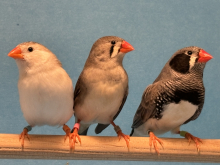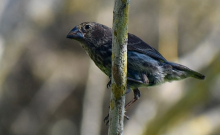A new McGill University study has found a direct link between age‑related declines in neuron activity in the cerebellum and worsening motor skills, including gait, balance and agility. While it is well known that these abilities diminish with age, this is the first research to pinpoint how changes in Purkinje cells – a key type of cerebellar neuron – drive this decline and translate into measurable changes in behaviour and physical function.


Researchers at McGill University and the United States Forest Service have found that plants living in areas where human activity has caused population crashes carry long-lasting genetic traces of that history, such as reduced genetic diversity. Because genetic diversity helps species adapt to climate change, disease and other stresses, the study suggests it is vital to consider a population’s history-influenced genetics alongside its size and habitat in conservation planning.

Freshwater browning is stunting fish growth of some species, shrinking populations of others and changing the composition of fish communities, McGill-led research suggests. “Browning” refers to freshwater bodies turning tea-coloured, a phenomenon driven by higher levels of dissolved organic matter and/or higher levels of iron in the water. Causes include changes in land use and climate, and reduced acid precipitation.
The findings indicate that changes in land use and climate are affecting biodiversity and how ecosystems function, with implications for fisheries management.

Phytotron Manager Mahnaz Mansoori (pictured above, left, with Biology Department Chair Prof. Gregor Fussmann) was one of nine McGill staff members honoured with the President’s Award for Administrative and Support Staff at last week's afternoon convocation ceremony. These annual awards recognize the talent, dedication, and hard work of staff members who have made outstanding contributions to the University’s mission.

Congratulations to Jérôme Waldispühl and Attila Szantner (Computer Science), The Eclipse Task Force (Physics), and Andrew Gonzalez (Biology), who are among this year's winners of the President’s Prize for Public Engagement through Media!
In announcing the winners and runners-up, President and Vice-Chancellor Deep Saini noted that they were among a strong field of applicants spanning all 12 Faculties.
“This is further evidence that the sharing of knowledge and a love of learning are core McGill values,” he said.

Louis-Philippe Bateman’s fascination with megalodon began with a single sentence in a book about Canada’s geological evolution. It described giant, mysterious fossilized shark teeth discovered in the 1960s by fishermen dredging for scallops off Canada’s Atlantic coast. The curiosity felt by the teenager with a budding interest in paleontology would resurface in a meaningful way during his undergraduate years at McGill University.

The Bieler School of Environment (BSE) is thrilled to announce Professor Anthony Ricciardi as its new director, effective immediately. An expert in invasion ecology and aquatic ecosystems, Ricciardi has been a key figure at the school since 2001 and now steps up to lead.
“My vision for the School is to become the gateway of environmental research at McGill,” said Ricciardi.
Founded in 1998, the BSE appoints directors for five-year terms.

A new study on songbirds sheds light on the power of social interaction to facilitate learning, insights that potentially apply to human development.
McGill University researchers discovered that zebra finches deprived of early social experiences could still form strong bonds with a partner later in life. Once placed into cohabitation with a male, females that had never heard a mating song before could quickly develop a preference for his melody.

New McGill study sheds light on the cerebellar nuclei
In a new article published today in Nature Communications, a team of McGill researchers led by Professor Alanna Watt of the Department of Biology examines the spatial organization of neurons in the cerebellar cortex. The findings offer new insight into how information is integrated in the cerebellum and shed light on the role of the often-overlooked cerebellar nuclei.

As the climate warms, many species are on the move, raising new challenges for policy-makers around the world. Shifts in the ranges of mosquitoes and disease-bearing ticks and bats are introducing illnesses such as malaria and Lyme disease into regions where health-care systems are unprepared. Movements of commercially important fish from one jurisdiction to another are shifting job opportunities and causing trade disputes.

Ehab Abouheif, James McGill Professor in the Department of Biology at McGill, has been elected a Fellow of the American Association for the Advancement of Science (AAAS), one of the highest distinctions in the global science community, which recognizes contributions to science and technology, scientific leadership, and extraordinary achievements across disciplines.

Located in the heart of the Montérégie region, in Mont-Saint-Hilaire, McGill University’s Gault Nature Reserve comprises more than 1,000 hectares of lush old-growth deciduous forest, just 40 km from Montreal. A refuge for migratory birds, Gault is at the heart of Canada’s first UNESCO-recognized biosphere reserve.

Evolutionary biologists have long suspected that the diversification of a single species into multiple descendent species – that is, an “adaptive radiation” – is the result of each species adapting to a different environment. Yet formal tests of this hypothesis have been elusive owing to the difficulty of firmly establishing the relationship between species traits and evolutionary “fitness” for a group of related species that recently diverged from a common ancestral species.

Researchers zero in on spinocerebellar ataxia type 6, a disease that disrupts brain function
Researchers from McGill University, led by Professor Alanna Watt of the Department of Biology, have identified previously unknown changes in brain cells affected by a neurological disease. Their research, published in eLife, could pave the way to future treatments for the disease.

In a new study from McGill University, researchers bring science into an unexpected setting: a tattoo parlor. In this first characterization of the human piercing microbiome, the uniquely human cultural practice of piercing serves as a model system to help us better understand how biological communities (re)assemble after catastrophic environmental disturbances.
